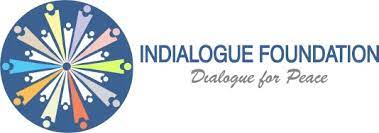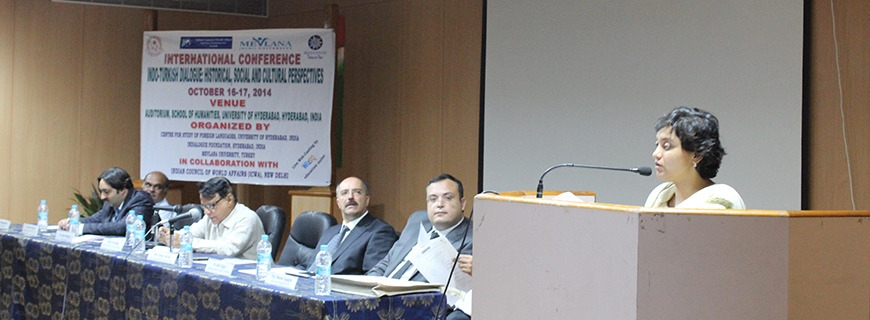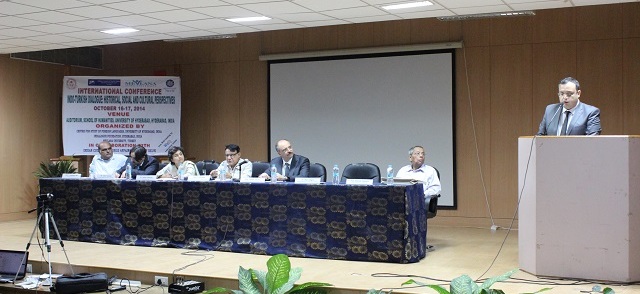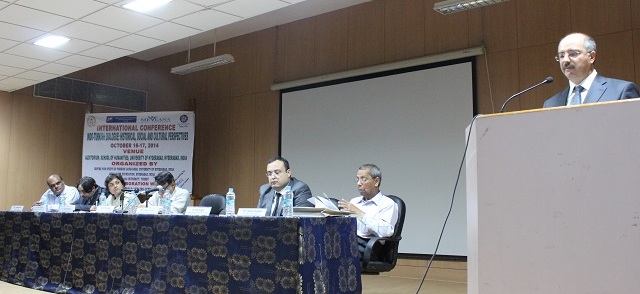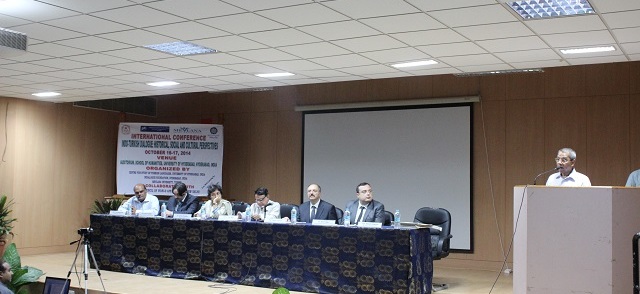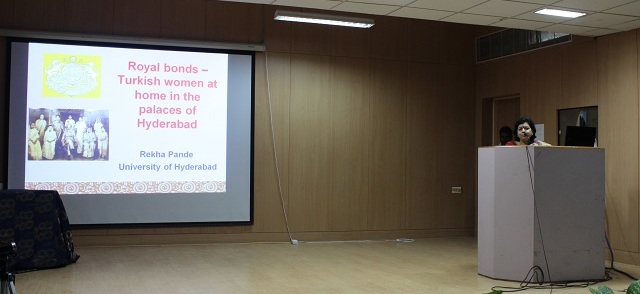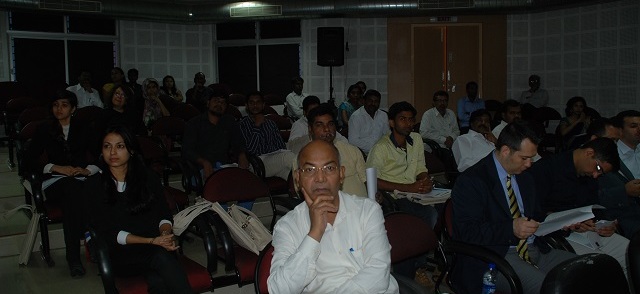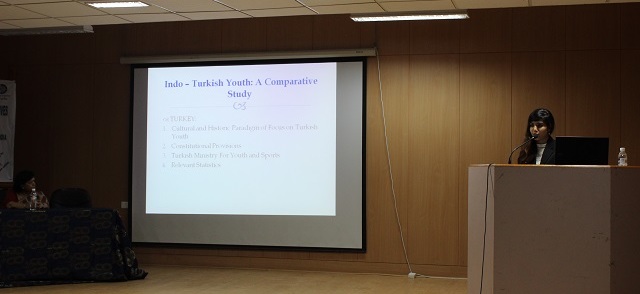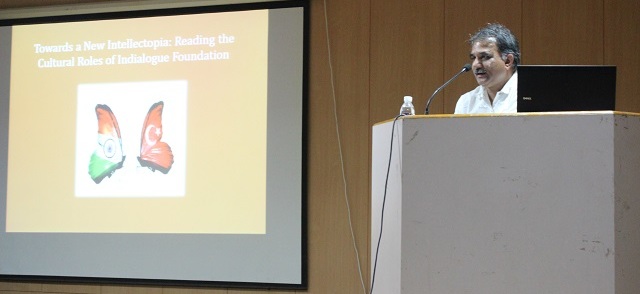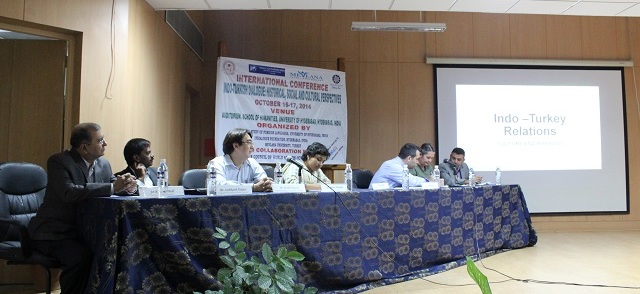By Jhilam Chattaraj,
HYDERABAD, 16-10-2014: “New dialogues, new beginnings”. The first International conference on ‘Indo-Turkish Dialogue: Historical, Social and Cultural Perspectives’ was held at the University of Hyderabad, Hyderabad, India from 16-17th October, 2014. The conference was jointly organised by Mevlana University, Turkey, Center for the Study of Foreign Languages, University of Hyderabad, India, Indialogue Foundation, India in collaboration with the Indian Council for World Affairs, India. The conference aimed to promote fruitful academic interactions on Indo-Turkish relations.
The inaugural address was made by Prof.E.Hari Babu, Pro Vice-Chancellor, University of Hyderabad. He emphasised on the need for the revival of Indo-Turkish relations in the context of contemporary global political crises. The welcome address was made by Prof. Amitabha Dasgupta, Dean School of Humanities, University of Hyderabad. The scope of the conference was stated by J. Prabhakar Rao, Professor, Center for the Study of Foreign Languages. President, Indialogue Foundation observed that the conference was of great contemporary relevance as both ‘Turkish and Indian people are in a process of rediscovering each other’. He alluded to the previous diplomatic agreements between India and Turkey and the future possibilities for academic and cultural collaborations. Prof. Tankut Yalcinoz, Vice Chancellor, Mevlana University, Turkey expressed the need for more academic interaction between the host universities. Indrani Talukdar, Research Fellow at Indian Council of World Affairs, New Delhi observed how international relations between Turkey and India could be improved by practising a culture free of prejudices and dominance. She highlighted the importance of everyday culture rather than policy-making. Her paper struck the key note of the conference and that being the importance of dialogue and heartfelt cultural interactions between India and Turkey. The vote of thanks was given by Mr. Osman Kayaoglu, Indialogue Foundation, Hyderabad.
The first session of the day began with a panel discussion on ‘Culture and Foreign Policy in the Context of Indo-Turkish Relations’. It was chaired by Dr. Bezen Coksun, Zirve University, Turkey. The panellists included Dr. Pitam Singh, Joint Advisor, Planning Commission, India. He explored how cultural differences between Indian and Turkish citizens determined the success or failure of mutual business transactions. Mr. Sri Ravindra Modi, Vice-President, FAPCCI, Hyderabad talked about the immense scope for commercial bonding between Turkey and India. Dr. Hakan Gok, Director, International Affairs, Mevlana University, reiterated the Sufi cultural link between India and Turkey. Mr. Oguz Canbolat, Director, TICCI, Hyderabad informed about the upcoming economic agreements between the respective nations. Mr. Nurdin Kaparov, Director, Indialogue Foundation, New Delhi, offered a comprehensive account on the cultural, philosophical, social and humanitarian work taken up by Indialogue Foundation in India since its inception in the year 2005. Mr. Sashikantha Kakara, Managing Director, Headstream Advisory, Hyderabad analysed how communication gaps due to lack of cultural knowledge affected the corporate offshore business between India and Turkey.
Session two on ‘Indo-Turkish Bilateral Relations’ began with the paper titled, “‘Modern’ Indian and Turkey: Learning Democratic Experience from Each Other’ by Dr. Anwar Alam, and Bezen Coksun. The paper focused on the different ways in which Turkey and India shaped the role of the state and people in formulating their respective democracies. The second presentation titled, ‘Towards a new Intellectopia: reading the cultural roles of Indialogue Foundation’ was presented by Jhilam Chattaraj, research scholar, University of Hyderabad, Mr. Abu Sadik Kaunnath, Hamdard University, New Delhi, and Mr. Nurdin Kaparov. The paper analysed the cultural practises of Indialogue Foundation with the help of cultural, sociological and literary insights. It studied the Foundation’s seminal role in initiating dialogue between Indian and Turkish people both at a scholarly and popular level.
Session three, on ‘Women and Youth Empowerment: India and Turkey’, began with the paper, ‘Royal Bonds –Turkish Women at Home in the Palaces of Hyderabad’ by Prof. Rekha Pande, University of Hyderabad. She focussed on the post-marital lives of Turkish princesses Durru-Shewar and Niloufer and their positions in contemporary feminist thought. It was followed by a presentation by Ms Paridhi Singh, Jindal Global Law School, on ‘Indo-Turkish Young Voices: Economic Progress through Youth Empowerment and Exchange’.
The second day of the conference focussed purely on the artistic, cultural and linguistic connections between India and Turkey. The fourth session began with the paper, ‘Indo-Turkish Cultural and Literary Interactions’ by Mohsin Ali, Jamia Milia Islamia, Delhi and Dr. Turgut Kocoglu, Erciyes University, Turkey. The next paper ‘Layla: Linking Three Oceans and a Divine Sea’ was presented by Dr. Maria Dolores Gracia-Borron, Spain. In the fifth session, Sujata Ojha traced the genealogy of Usta art as practised by a depleting group of artist in the Bikaner region of Rajasthan to Turkey. She generated a discussion on the need for a market for the works by Usta artists both in Turkey and India. Her presentation was followed by Suhail V.H.’s paper on ‘Transnational Architectural Transactions and its Cultural Impact through Indo-Turkish Connection’. The next paper, ‘Painting as History: Orhan Pamuk, Tom Stoppard, Ranjit Desai’ by Prof. Tutun Mukherjee, perceived Turkey more as a part of Asia than Europe. It explored how the mentioned novelists both Indian and Turkish used painting as a local form of historiography that could challenge the European ways of writing history. From literature, the focus of the conference shifted to language. In a special lecture, titled as ‘Turkish-Telugu Genetic Relationship’ by Prof. G. Uma Maheswara Rao, many unknown commonalties were traced between Dravidian languages of India and Turkish. Next, a special session was arranged on ‘Indo-Turkish Academic Collaboration among Higher Education Institutions in India and Turkey’. It explored the possibilities of mobilising scholarly exchange between the nations in multiple disciplines. This was the last session and was followed by the Valedictory.
The conference was an eclectic mix of academic interests on Indo-Turkish relations. It was being live webcasted by Wiz IQ, Education Online. The conference aimed to discover new horizons on Indo-Turkish alliances by highlighting the significance of generating new cultural dialogues. The two day knowledge exchange in Hyderabad between India and Turkey hopefully marked the beginning of a beautiful friendship.
*The author is the Research Scholar in University of Hyderabad
